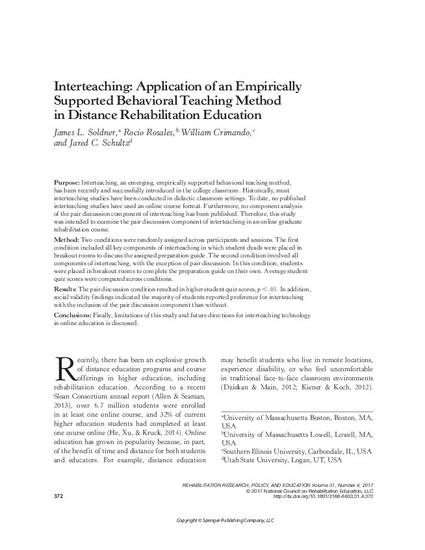
Article
Interteaching: Application of an empirically supported behavioral teaching method in distance rehabilitation education.
Rehabilitation Research, Policy, and Education
(2017)
Abstract
Purpose: Interteaching, an emerging, empirically supported behavioral teaching method,
has been recently and successfully introduced in the college classroom. Historically, most
interteaching studies have been conducted in didactic classroom settings. To date, no published
interteaching studies have used an online course format. Furthermore, no component analysis
of the pair discussion component of interteaching has been published. Therefore, this study
was intended to examine the pair discussion component of interteaching in an online graduate
rehabilitation course.
Method: Two conditions were randomly assigned across participants and sessions. The first
condition included all key components of interteaching in which student dyads were placed in
breakout rooms to discuss the assigned preparation guide. The second condition involved all
components of interteaching, with the exception of pair discussion. In this condition, students
were placed in breakout rooms to complete the preparation guide on their own. Average student
quiz scores were compared across conditions.
Results: The pair discussion condition resulted in higher student quiz scores, p , .01. In addition,
social validity findings indicated the majority of students reported preference for interteaching
with the inclusion of the pair discussion component than without.
Conclusions: Finally, limitations of this study and future directions for interteaching technology
in online education is discussed.
Disciplines
Publication Date
2017
Citation Information
James L. Soldner, Rocio Rosales, William Crimando and Jared C. Schultz. "Interteaching: Application of an empirically supported behavioral teaching method in distance rehabilitation education." Rehabilitation Research, Policy, and Education (2017) Available at: http://works.bepress.com/james_soldner/17/
